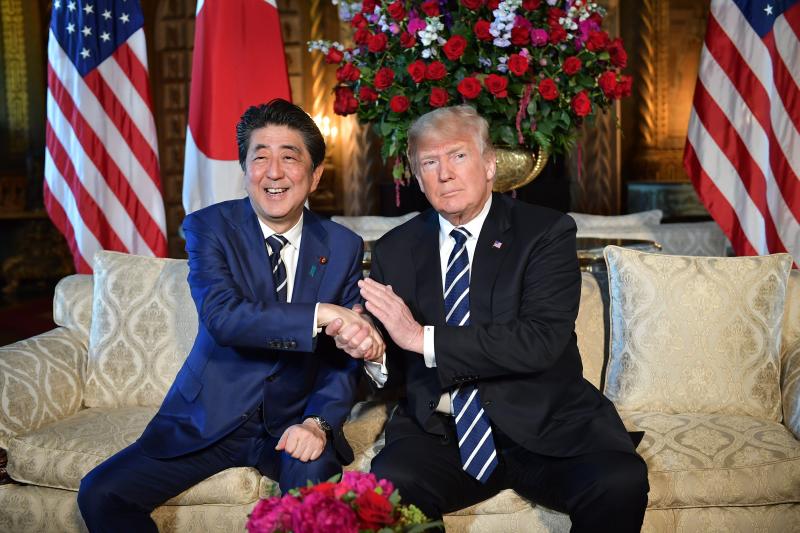Abe credits Trump on North Korea, scores win on abductee issue
Sign up now: Get ST's newsletters delivered to your inbox

US President Donald Trump with Japanese Prime Minister Shinzo Abe at Trump's Mar-a-Lago resort in Palm Beach, Florida, on April 17, 2018.
PHOTO: AFP
Follow topic:
WASHINGTON - US President Donald Trump lent a helping hand to beleaguered Japanese Prime Minister Shinzo Abe on the first day of their two-day summit in Florida, assuring him that he would raise the issue of Japanese abductees when he meets North Korean leader Kim Jong Un.
The abductee issue is a high-profile one in Japan and is critical for Mr Abe, who is under pressure over a number of scandals. Before he left home, he said it would be high on his agenda in the meeting with Mr Trump.
"We will bring up the abductees… It's a time for talking, it's a time for solving problems," the US leader told newsmen after meeting Mr Abe, who was clearly relieved.
"This reflects your deep understanding for how Japan cares about this abduction issue; I am very grateful for your commitment," the Japanese Prime Minister told Mr Trump.
North Korea has acknowledged abducting 13 Japanese while Japan maintains the number is 17. Five have returned home and North Korea insists the remaining eight died.
Mr Abe said he and Mr Trump had "successfully forged a mutual understanding" after "very in-depth discussions" on North Korea and on economic issues.
Mr Abe also gave full credit to his host for engaging with North Korea.
"Donald, you demonstrated your unwavering determination in addressing the challenge," he said.
The two leaders met one on one and with their wives as well at Mr Trump's Mar-a-Lago estate, in Florida. The President and First Lady Melania Trump hosted Mr Abe and his wife, Mrs Akie Abe, to an al-fresco dinner.
On the second day, their summit was set to broaden to delegation-level talks on trade and energy strategies in the Indo-Pacific, with time to spare for a round of golf for Mr Trump and Mr Abe.
"Getting Trump to raise the abduction issue is a big 'get' for Abe," Ms Shihoko Goto, senior North-east Asia associate at the Wilson Centre's Asia Programme, told The Straits Times in an e-mail. "But this won't change the fact that Tokyo's strategic interests lie in being part of the negotiations in dealing with North Korea's denuclearisation and dealing with shorter-range capabilities as much as long-range missiles."
Mr Trump said that he he was looking forward to meeting Mr Kim, disclosing that five sites were under consideration for the planned summit with the North Korean leader.
"They do respect us. We are respectful of them," the President said. "We don't really have a choice. It must be taken care of one way or another."
He added: "There's a great chance to solve a world problem. This is not a problem for the United States. This is not a problem for Japan or any other country. This is a problem for the world."
Asked by a reporter if he had spoken with Mr Kim, Mr Trump said "Yes" but later clarified that there had been "direct talks at very high levels, extremely high levels, with North Korea".
"I really believe there's a lot of goodwill," he said.
The US President later confirmed through a tweet that CIA director Mike Pompeo, who is awaiting confirmation as Secretary of State, met Mr Kim in North Korea last week.
"Meeting went very smoothly and a good relationship was formed. Details of Summit are being worked out now," Trump tweeted.
Besides North Korea, Mr Abe was expected to have made a case for the suspension of US tariffs on aluminium and steel - a favour extended to several American allies but not yet to Japan.
Earlier on Tuesday, Mr Larry Kudlow, the newly installed director of Mr Trump's National Economic Council, said that a waiver for Japan was "on the table". He did not say what Mr Trump would ask in return.
Trade and economic issues were to be addressed on the second day of the summit. But the leaders appeared to have already touched upon the issue of the return of the US to the Trans Pacific Partnership (TPP) - the 12-nation free trade agreement - which Mr Trump pulled out of shortly after taking office. The TPP has now become the 11-nation CPTPP, minus the US.
The idea of the US rejoining was received with guarded optimism in Japan.
Soon after the dinner with Mr Abe, Mr Trump suggested he still had doubts about the deal.
"While Japan and South Korea would like us to go back into TPP, I don't like the deal for the United States," he tweeted.
"Too many contingencies and no way to get out if it doesn't work. Bilateral deals are far more efficient, profitable and better for OUR workers."

